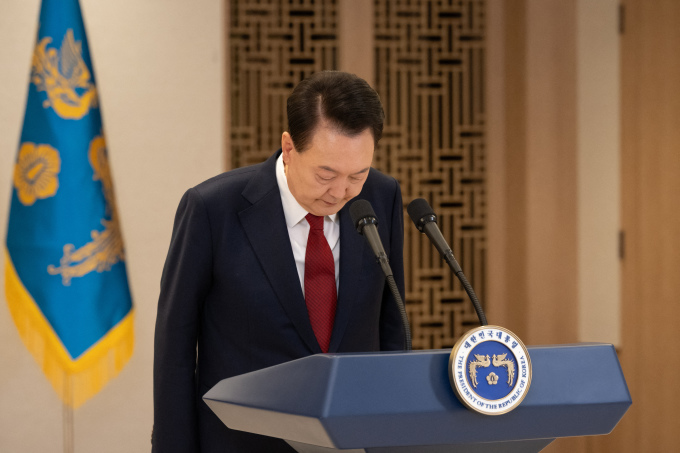
A political crisis in South Korea has left efforts to establish ties with the incoming U.S. administration leaderless, causing concern among many South Korean businesses.
Less than a month remains before the new U.S. administration takes office. President-elect Donald Trump has repeatedly declared plans to impose heavy tariffs on foreign goods and reevaluate subsidies for companies investing in the U.S., including those from Washington’s key allies and largest trading partners.
Meanwhile, South Korea is grappling with a severe political crisis following President Yoon Suk-yeol’s declaration of martial law earlier this month. Yoon was impeached by South Korea’s National Assembly on December 14, resulting in his suspension and the possibility of permanent removal from office.
Prime Minister Han Duck-soo assumed the role of acting president, but the National Assembly subsequently impeached him as well. Finance Minister Choi Sang-mok has now stepped in as acting president and prime minister. This political instability has left South Korea’s efforts to engage with the incoming U.S. administration without direction. Insiders say the country’s diplomatic efforts have been “paralyzed” for days.
“No one in the government is representing South Korea’s interests at a time when we need it the most,” said a representative of a conglomerate that invested billions of dollars in the U.S. during Joe Biden’s presidency. “We can’t withdraw our investments now. We feel like hostages.”
Economic Risks
South Korea’s export-driven economy faces potential risks under the new U.S. administration. Trump could impose higher tariffs on South Korean goods or revoke subsidies promised by Biden for chip, battery, and electric vehicle manufacturers.
These threats come at a challenging time for South Korea’s economy, which is struggling with declining domestic demand, soaring private debt, and increasing competition from Chinese exporters.
Foreign Minister Cho Tae-yul acknowledged the political instability’s impact on diplomacy but vowed to “regain momentum as quickly as possible.”
Yeo Han-koo, a former South Korean trade minister now with the Peterson Institute for International Economics in Washington, said that even before the political crisis, “there was a sense of near-panic in South Korea.”
Yeo noted that policymakers and business leaders had been “scarred” during Trump’s first term, when he threatened to cancel the bilateral free trade agreement and withdraw U.S. troops from South Korea unless Seoul contributed more to their upkeep.
Business Concerns
In a survey of 239 companies conducted by the Federation of Korean Industries this month, 82% believed South Korea’s economy would be harmed by Trump’s expected protectionist policies.
However, Yeo argued that some fears about the new U.S. administration were “overblown,” noting that “much has changed” since Trump’s first term. South Korea was the largest source of foreign direct investment into the U.S. last year, with companies investing tens of billions of dollars in American semiconductor and green technology manufacturing facilities.
“South Korea can argue that it contributes more to the revival of U.S. manufacturing than any other country and deserves recognition,” Yeo said.
Yet many South Koreans feel this may not be enough.
“We tried to appeal to them by emphasizing that South Korea is the largest foreign investor creating jobs in the U.S. But we’ve been told that doesn’t matter to Trump—he’s more interested in what South Korean companies will do now. He doesn’t want to hear about what they did in the past,” said a senior executive at one of South Korea’s top industry associations.
Challenges Ahead
South Korea’s trade surplus with the U.S. reached $28.7 billion in the first half of 2024 and is expected to surpass last year’s record $44.4 billion, according to the Korea International Trade Association.
Another source of concern for South Korea is the return of former trade envoy Peter Navarro as a senior economic advisor. Navarro previously accused South Korean companies like Samsung and LG of “trade cheating” by relocating production to avoid anti-dumping measures. Trump recently praised Navarro for helping renegotiate “unfair” trade agreements like NAFTA and the U.S.-Korea Free Trade Agreement.
Analysts suggest South Korean companies face significant challenges, including high construction and labor costs, skilled worker shortages, visa issues, and unreliable power supply. The depreciating Korean won and declining demand for electric vehicles further diminish South Korea’s competitiveness.
A Grim Outlook
Lee Tae-kyu, a senior fellow at the Korea Economic Research Institute (KERI), believes South Korea’s economy could still grow if Trump’s tariffs primarily target Chinese exports. Lee added that sectors like shipbuilding, defense, and petrochemicals could benefit. Seoul might also reduce its trade surplus by increasing purchases of U.S. weapons and fossil fuels.
However, Lee warned that South Korea’s electric vehicle and battery manufacturing industries could face disaster if Trump strikes a major trade deal with China, allowing Chinese companies to build factories in the U.S. Trump has said he would consider such an arrangement.
“If Chinese companies are allowed to set up plants in the U.S., it would be catastrophic for us. Yet even our government officials don’t seem to know who can raise these concerns with Washington,” said an executive in South Korea’s battery industry.
(Sources: FT, Reuters, Yonhap)
Hello Shuttle will strive to bring the latest updates. At the end of the day.
Are you looking for reliable airport and cruise port transfer services in Los Angeles?
We offer professional, safe, and punctual transportation from
Los Angeles Airport - LAX
Long Beach Airport - LGB
John Wayne Airport - SNA
San Pedro cruise port
Long Beach cruise port
Disneyland
and other destinations.
Let us make your journey stress-free and comfortable with our dedicated drivers and high-quality vehicles. Book now for the perfect travel experience at www.helloshuttle.com or call 944-800-5678!


